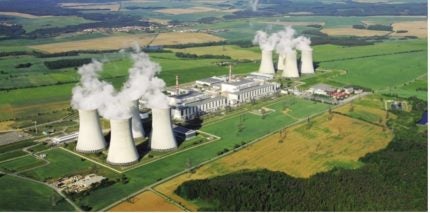
The Czech anti-monopoly Office for the Protection of Competition (UOHS – Úřad pro Ochranu Hospodářské Soutěže) has put a temporary block on the conclusion of a contract with South Korea’s Korea Hydro & Nuclear Power (KHNP) selected in July as preferred bidder for the construction of up to four new units at power company ČEZ’s Dukovany and Temelín NPPs. The temporary block was announced following challenges raised in September 2024 by unsuccessful bidders US Westinghouse and France’s EDF. Although UOHS rejected the challenges from Westinghouse and EDF, it maintained the block but said this was not indicative of how the case will be decided. UOHS said the parties could still appeal its decisions, which were not final.
Westinghouse had been excluded from the tender in January, because it “did not meet the necessary conditions”. Elektrárna Dukovany II (EDU II), a wholly owned subsidiary of ČEZ had in June submitted to the Ministry of Industry & Trade (MIT) its evaluation of the offers. In January, the government had amended the tender to binding offers for up to four reactors, rather than just one as specified in the original tender. EDF had offered its EPR1200 reactor and KHNP its APR1000 and Westinghouse its AP1000.
ČEZ said it believed the temporary block would not impact the tender’s schedule. The aim is to conclude negotiations with KHNP and sign contracts by the end of March 2025. The first reactor is expected for completion by 2036. The cost of the currently preferred construction for two reactors is CZK 400bn ($17bn).
UOHS noted in its decision that the complaints from EDF and Westinghouse were inadmissible because they fell outside legal grounds, as the tender was conducted under a security exemption. This exemption allows ČEZ to proceed without complying with the general rules for public procurement. ČEZ says the bidders were informed about the exemption at the beginning of the tender, meaning their complaints are now inadmissible.
Westinghouse’s main objection was that the KHNP bid implied impossible export of Westinghouse’s licence without the agreement of the relevant US public authorities. Westinghouse maintains that KHNP’s APR1000 is based on technology which originated with Westinghouse. KHNP insists its technology is original.
EDF questioned whether the tendering process “adheres to the principles of fair trade and transparency,” arguing that KHNP’s guarantees on price may commit South Korea’s public finances, if the costs announced in the bid are exceeded.
MIT did not want to comment directly on the UOHS decision. But said ČEZ had discussed the method of selecting a supplier with the Office as early as 2020 and the state also had discussions with the European Commission as part of the notification of public support for the new unit. “We do not expect that these steps by unsuccessful applicants to affect the project itself,” ministry spokesman Marek Vošahlík told ČTK.






